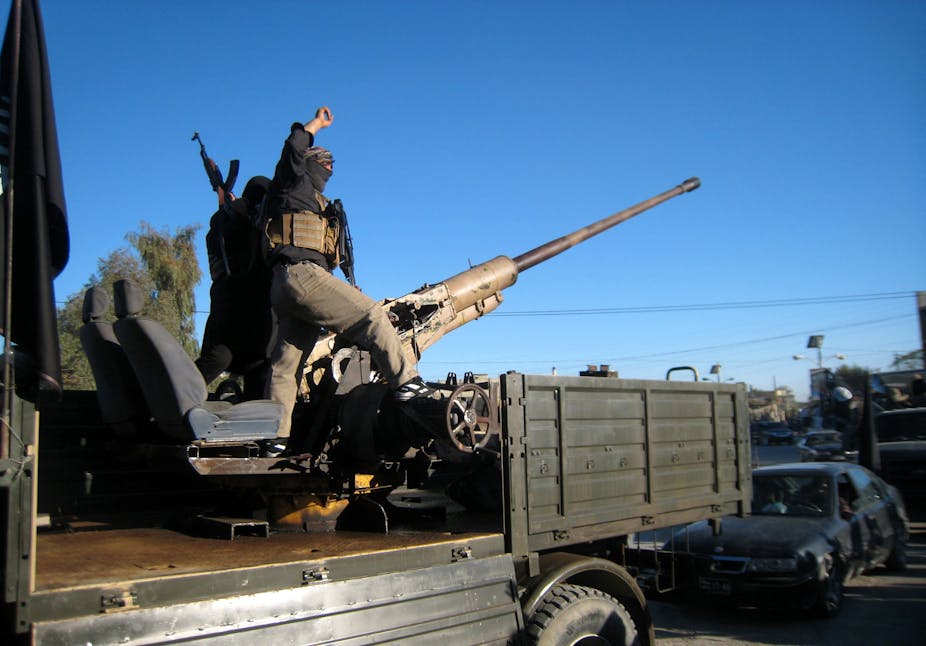The capture of most of Mosul, Iraq’s second city, by Islamist paramilitaries has caused shock across the Middle East and in western capitals, especially Washington, but follows a pattern developing over many months. This has involved the progressive takeover of territory in Syria and Iraq by the Islamic State of Iraq and the Levant (IS), as it seeks to establish an Islamist state.
As I wrote only last week: “Taking the two countries together we are now in the remarkable position of seeing radical Islamist groups having free rein across an area larger than the UK, right in the heart of the Middle East.”
The collapse of the Iraqi Army and the loss of government control is certainly very sudden, especially as the defending forces appear to have had at least a 15-to-1 superiority in numbers. Of even greater concern is what happens next. Reports suggest IS militia has already reached the important oil town of Baiji, halfway to Baghdad, and may even control parts of Tikrit, which is closer to the capital and a key centre of Sunni paramilitary opposition to US forces when they were in Iraq a decade ago.
Baiji itself is a town of 200,000, which was apparently abandoned overnight by government troops with few shots being fired. It is especially important because its power station is a major generating facility that supplies much of central Iraq including part of the electricity supply base for Baghdad.
Further south towards the capital lies Samarra, another centre of opposition. All this is happening when IS militias already control Fallujah, the “City of Mosques” west of Baghdad, which was the centre of bitter fighting against US forces in April and November 2004. Fallujah is significant because it has been under insurgent control for months. The government has not even tried to re-take it, preferring to try and lay siege to the city in an operation that has been conspicuously unsuccessful.
Evolving insurgency
All of these recent developments have been in the context of an evolving insurgency that has been taking root for more than two years. It has led to many thousands of civilian deaths, especially in central and northern Iraq. While not yet approaching the appalling violence of 2003-2008, the situation is getting worryingly close to that. Indeed it is beginning to take on the character of a civil war that is hugely complicated by the open border between Iraq and Syria and the numerous interconnections between IS and other Sunni paramilitaries in the two countries.
Two further elements in the evolving violence are important within and beyond the region. One is that many of the people now active in IS are highly experienced paramilitaries who gained urban combat experience against well-armed and well-trained US Army and Marine Corp units. They are determined, radical and often brutal in their actions and many are willing to die for their cause. The second is that IS and some other Islamist groups are attracting young men from well beyond the Middle East, including Britain, France and the United States. This is a source of concern to security agencies who fear a new era of domestic unrest when some of the young men return home.
Meanwhile the Iraqi prime minister, Nouri al-Malaki, has been trying to form a new administration after the inconclusive national election results of April 30. As the leader of the largest Shia-orientated party he has sought in recent years to support the Shia majority in Iraq at the expense of the Sunni minority. This remains a popular stance, even now, with the Shias still having bitter memories of how they were marginalised during the decades-long Saddam Hussein era.
It also results in a much more recent but enduring bitterness among many Sunnis at how they are now treated. This is one of the main reasons why even a brutal and radical organisation like IS has a degree of support.
In this intensely fractured atmosphere, there have been repeated calls for Malaki to adopt a more conciliatory approach to the Sunni minority but it is an approach that has so far got nowhere. Indeed, the current upsurge in violence is likely to have the opposite effect as Shia communities increasingly fear the impact of the insurgency on their own lives.
It is a fear that is exacerbated by the frequent and very deliberate attacks by IS and other radical Sunni Islamist on Shi’a communities. These attacks are intended to increase the risk of inter-communal conflict that would bring Iraq even closer to all-out civil war.

